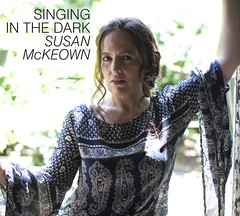 John-Francis Bourke Susan McKeown’s new CD, “Singing in the Dark,” explores her family’s history of mental illness.
John-Francis Bourke Susan McKeown’s new CD, “Singing in the Dark,” explores her family’s history of mental illness.In September, songwriter Susan McKeown produced an album of children’s playground songs from all over the world, sung by East Village Community School students.
In stark contrast, her newest CD is a dark, often melancholic journey into the murky world of mental illness. The Irish-born Grammy Award-winning songwriter has forged an album that explores the connection between creativity and madness, brilliance and mental illness, helplessness and hope.
Singing in the Dark, released late last month, is Ms. McKeown’s attempt to grapple with her family’s history of mental illness. Three generations of men on her father’s side suffered from manic depression. “Because it’s in my family, it’s a way to take it on,” Ms. McKeown said. “It’s a way to help by addressing the issue.”
The 20-year resident of the East Village said she wanted to find a way to discuss mental illness that was free from the stigma that plagues diseases like schizophrenia. “Music is powerful and, like poetry, it expresses moods,” Ms. McKeown said. “By linking mental illness with creativity, and letting people ponder it through poetry and music, it seemed like a very human way to approach a subject that many learn about from sources such as commercials for pharmaceuticals”
The lyrics for “Singing in the Dark” originate from poems like Theodore Roethke’s “In a Dark Time,” Anne Sexton’s “Her Kind,” and “The Nameless One” by James Clarence Mangan.
“I read a lot of Irish nature poems about living solitary lives amongst nature,” Ms. McKeown said. “I looked for singability and something in the lyrics that speaks to creativity.”
Whether she’s backed by electric and acoustic guitars, accordion or piano, it is Ms. McKeown’s quivering, but relentless voice that dominates the soundscape. This, in turn, pushes the poetry to the forefront. Lyrics like, “there’s a crack in everything, that’s how the light gets in” from the Leonard Cohen cover “Anthem” are among the many references to the link between brilliance and madness. “The creativity exists because of the mental illness,” Ms. McKeown said. “It offers a way to deal with what’s been handed to you.”
Stream songs from “Singing in the Dark” here.




